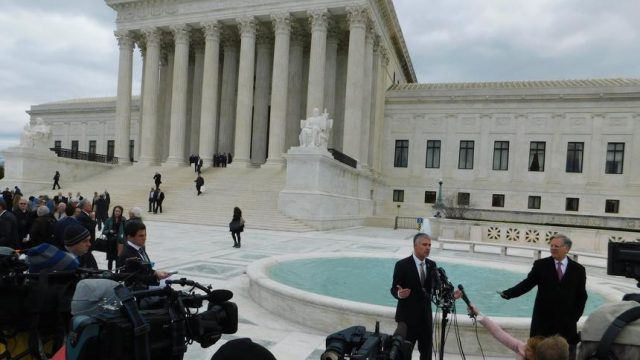We Should Be Worried About What the Supreme Court’s Online Sales Tax Decision Does to the Interstate Commerce Clause

This week the U.S. Supreme Court struck down their precedent in Quill vs. North Dakota and ruled that it was legal for states to apply their sales tax to companies without a physical presence in their borders. In the Quill case, which had to do with a mail order business, the courts held that states could not tax businesses without a presence in their borders.
The reaction from most North Dakota leaders – including people like Governor Doug Burgum, Tax Commissioner Ryan Rauschenberger, and Senator Heidi Heitkamp – has been celebratory.
“It’s all about fairness,” said state Senator Dwight Cook, a Republican from Mandan who sponsored legislation in the 2017 session allowing North Dakota to implement taxes on online sales should Quill be struck down.
That seems to be the basis for most reactions to the ruling. Many feel that it’s unfair for brick-and-mortar retailers to collect and remit the tax while online retailers, at least those without a physical presence in a given state, are not under the same obligation.
I’m sympathetic to the argument, but I’m worried about what this decision does to the protections afforded states by the interstate commerce clause. Justice Neil Gorsuch, while concurring with the decision to overturn Quill, noted in his opinion that this presents unresolved questions in regard to the commerce clause of the Constitution:
My agreement with the Court’s discussion of the history of our dormant commerce clause jurisprudence, however, should not be mistaken for agreement with all aspects of
the doctrine. The Commerce Clause is found in Article I and authorizes Congress to regulate interstate commerce. Meanwhile our dormant commerce cases suggest Article III courts may invalidate state laws that offend no congressional statute. Whether and how much of this can be squared with the text of the Commerce Clause, justified by stare decisis, or defended as misbranded products of federalism or antidiscrimination imperatives flowing from Article IV’s Privileges and Immunities Clause are questions for another day.
If North Dakota can tax a company based in California because it sells products, by way of the internet, in North Dakota can California then tax North Dakota farmers who sell crops to California customers?
And if California can tax those farmers, can they regulate them too? And how about our politically polarizing friends in the oil industry. Almost all of the oil produced in North Dakota gets shipped out of state. Don’t you suppose there are politicians in those other states who might like to tax or regulate oil and gas activity in our state?
The purpose of the interstate commerce clause is to prevent the nightmare of fifty states squabbling with one another over trade wars between their constituent industries, or trying to exert political influence on one another. Congress, and not the states, is to regulate interstate commerce.
I feel like the Supreme Court, by overturning Quill and giving the states new powers to tax beyond their borders, has weakened interstate commerce protections and cracked open the lid to a real can of worms.
Meanwhile our politicians, even those usually protective of North Dakota’s right to regulate within its borders free of outside influences, are too busy slapping one another on the back over this rich new vein of tax revenues to notice.




